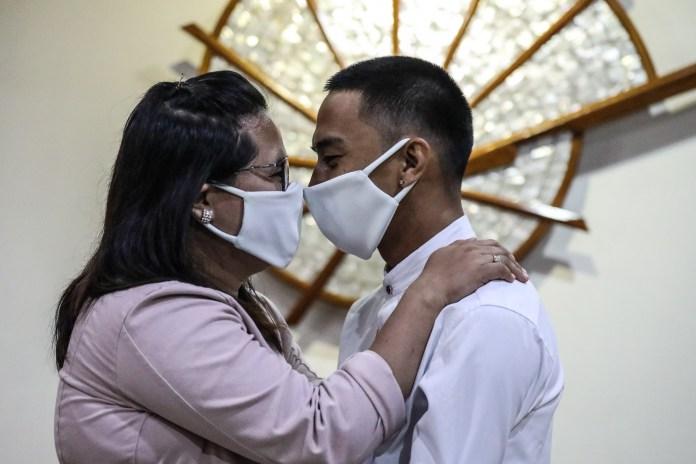Getting married in the midst of pandemic

Mark Saludes, LiCAS.news
JUNE was, and maybe still is, traditionally the most popular month to marry.
Supposedly, the goddess Juno (for whom June is named) was the protector of women in all aspects of life, but especially in marriage and childbearing, so a wedding in Juno’s month was considered most auspicious.
But how does one become a June bride, or groom, in the midst of lockdowns and strict quarantine measures?
Groom Jessie Boy Bañader kissed bride Rachell Defeo with masks on during a church wedding ritual that was witnessed by less than ten people.
Religious mass gatherings are still prohibited in the Philippine capital despite the more relaxed quarantine protocols.
Everyone in church, except for the couple, had to observe proper physical distancing. The newlyweds were, however, not exempted from wearing face masks.
“It was not an ideal wedding rite but it was the best God-given day of our lives,” said Rachell.
It took the couple more than a year to plan everything for the “big day.”
They have to talk with the suppliers, the catering service, the venue of the reception, the church, and the priest who would solemnize the union.
Jessie, 33, proposed to Rachell, 30, on New Year’s Day 2019. They agreed to set the date of their wedding on April 25 this year.
“We were so excited and did our best to get the plan in place,” said Rachell, adding that they almost finished paying for everything.
“We were just waiting for the day to come,” she said.
Then their world suddenly turned upside down when the country was placed under strict quarantine due to the new coronavirus disease.
Rachell said they were “too worried” about the possibility of postponing the wedding day to a later date, but they had to re-schedule it to December this year.
The future bride said December was a long wait. “For me, the ideal wedding ceremony is not important anymore. What’s important is we receive the sacrament,” she said.
On May 4, the couple was discussing the possibility of applying for a civil wedding when they decided to talk to a priest they know since they were young.
Jessie sent Father Eduardo Apungan, a Claretian missionary, a message asking if he could officiate the wedding rites and if it is allowed during the lockdown.
The priest immediately replied and told Jessie about the requirements.
On May 7, Father Apungan of the Immaculate Heart of Mary Parish in Quezon City solemnized the union of Jessie and Rachell in front of two witnesses.
“My parents were not able to join us because they cannot travel to Manila due to the lockdown,” said Rachell.
Jessie’s parents and a photographer, “to capture the most unforgettable day,” were present.
The Catholic Church in the Philippines has earlier issued liturgical guidelines for the celebration of sacraments in time of the pandemic.
In a pastoral statement, Bishop Honesto Ongtioco of Cubao said “only simple weddings, without an entourage, will be accommodated” during the lockdown.
“Only a maximum of ten persons, including the spouses, the parents, and a set of sponsors, will be allowed in the celebration,” read the instructions issued by the diocese.
“The time that has been dedicated to community quarantine unveiled unto us the reality and gravity of this pandemic,” said Bishop Ongtioco.
He said that the Church “recognizes all the recommendations and guidelines of the competent authorities in putting a stop to the spread and in recovering from the effects of this virus.”
“In the same measure of effort to sustain the lives of people, the Church may not set aside the interior life of her faithful,” said the prelate.
“Hence, we continued to nourish the spiritual life of the people by creatively adapting to the circumstances of this pandemic,” said Bishop Ongtioco.
Father Apungan told LiCAS.news that the COVID-19 pandemic has “led us to realize what is really important in our lives.”
“I spoke to a lot of people and one of the many reasons why they do not get married is because they do not have the financial capacity,” said the priest.
He said people are worried about the money that they have to spend for a wedding.
“All this time, we look at guests, the reception, the food, photo and video services, and all those preparations as essentials to a wedding ceremony,” said the priest.
“We are all wrong,” he added.
Father Apungan said the only essential thing in the celebration of matrimony is “our understanding that marriage is a covenant.”
“Marriage is a commitment not only between the couple but to God,” sad the priest, adding that a husband and wife enter into a lifelong partnership that “symbolizes God’s love.”
“So, the only persons needed in a celebration of matrimony are the couple, two witnesses, and the priest who will solemnize the union,” he said.
Father Apungan said couples do not need lavish preparations and grandiose wedding celebrations. “More than a social gathering, a wedding is a sacred plan of God,” he said.
The priest called on people who want to enter into a sacred union “to consider a simple wedding celebration.”
“With or without the pandemic, wedding celebrations must be simple,” he said.
“The extravagance and lavishness of a wedding rite do not matter at all if we do not understand that marriage is a covenant,” he added.
Jessie and Rachell are planning to renew their vows as soon as the pandemic ends.
The couple said they already talked to their suppliers who agreed to hold the celebration as planned after the pandemic.
“We still want to invite relatives and our friends to celebrate our union, but it could wait,” said Rachell.
“What’s important now is that we are officially husband and wife,” said the bride.
Radio Veritas Asia (RVA), a media platform of the Catholic Church, aims to share Christ. RVA started in 1969 as a continental Catholic radio station to serve Asian countries in their respective local language, thus earning the tag “the Voice of Asian Christianity.” Responding to the emerging context, RVA embraced media platforms to connect with the global Asian audience via its 21 language websites and various social media platforms.














